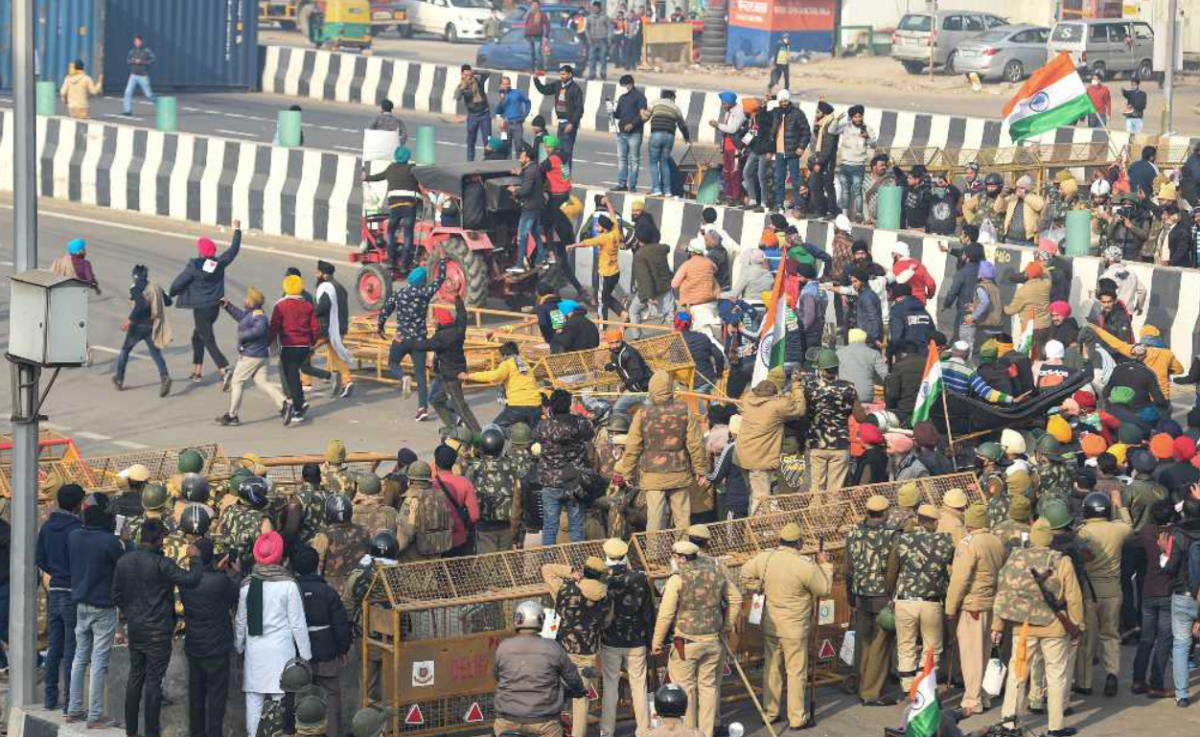Table of Contents
Imposition of Article 144 and Border Security
The “Delhi Chalo” march engineered to be set on 13th February is met by pre-emptive measures taken by the Delhi Police in form of the imposition of Article 144 in north-east Delhi. As the said date looms ahead, so does the threat of unrest and agitation. Delhi’s borders at Singhu, Ghazipur and Tikri have also witnessed the exacerbated security. Consequently large gatherings are a no-go till March 11.
Demands for MSP and Originating Grievances
Farmers from Punjab, Uttar Pradesh and Haryana are expected to make their impending walk into the city. The reason behind this gathering can be traced back to the farmer’s protest that took place in 2020. They are to promulgate their demand for a law guaranteeing MSP which was promised to them by the government when the previous protests were in full swing.
Delhi Police Commissioner Sanjay Arora issued an order on Monday, prohibiting all forms of rallies, processions, and road blockades within New Delhi for a month. This directive comes in response to the Samyukta Kisan Morcha (SKM), the Kisan Mazdoor Morcha (KMM), and various other farmers’ unions and associations announcing a ‘Delhi Chalo March’ scheduled for February 13.
The purpose of the march is to stage a protest outside the Parliament House to advocate for their demands. The order emphasizes the perceived risk of widespread tension, public nuisance, annoyance, social unrest, and potential violence should the participants enter New Delhi’s territory. The ban aims to preemptively mitigate these risks and maintain public order. Participants are urged to adhere to the directive to avoid legal repercussions.
Deliberations with the farmer groups are being summoned by the Centre however their intensifying security measures are met with chagrin and agitation of the said groups. On February 12th, the second meeting within a five-day span occurred in Chandigarh. Union Minister Piyush Goyal, Agriculture Minister Arjun Munda, and Minister of State for Home Affairs Nityanand Rai convened with representatives at this gathering. This followed a previous meeting held just days before, on Thursday, in Chandigarh, where Punjab Chief Minister Bhagwant Mann acted as the mediator.
Comprehensive Police Order
The Delhi Police has issued a comprehensive order, imposing stringent restrictions on various modes of transportation and entry into the city. Prohibitions extend to tractors, trolleys, buses, trucks, commercial vehicles, personal vehicles, and even protestors on horses originating from Uttar Pradesh. The North-East District Police has been specifically directed to enforce measures preventing protestors from crossing into Delhi.
Furthermore, the order mandates strict control over the use of sound amplification equipment such as loudspeakers and amplifiers. These devices are prohibited in private vehicles, buildings, or public places unless expressly authorized by the competent authority.
Preparations for the anticipated ‘Delhi Chalo’ march have prompted extensive security measures, particularly at the Punjab-Haryana borders in Ambala, Jind, and Fatehabad districts. Delhi Police Commissioner Sanjay Arora personally visited the Tikri, Singhu, and Ghazipur borders to assess security arrangements.
To reinforce border security, approximately 1,000 to 1,500 Delhi Police personnel are slated for deployment in each border area. However, this deployment strategy remains flexible, subject to adjustments based on evolving circumstances. Additionally, physical barriers such as iron containers and cemented barricades are being erected at these borders to fortify defenses and facilitate crowd control measures as needed.
Conclusion
In anticipation of the “Delhi Chalo” march and potential unrest, the Delhi Police has implemented stringent measures, including the imposition of Article 144 and bans on large gatherings. Farmer groups from Punjab, Uttar Pradesh, and Haryana seek to demand a law guaranteeing Minimum Support Price (MSP), recalling grievances from the 2020 protests.
The police order prohibits various modes of transportation and entry into Delhi, emphasizing public safety. Extensive security arrangements, such as personnel deployment and physical barriers at border points, aim to deter any potential disruptions. Despite ongoing deliberations, tensions persist between authorities and protesting groups. These measures underscore a commitment to maintain order and ensure the well-being of all residents and visitors during this critical period of heightened tensions.
